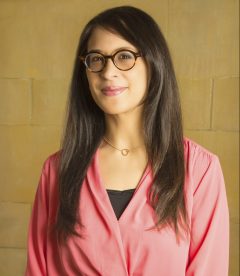In CFICE’s “Conversations With” series, we interview community-campus engagement (CCE) practitioners to get their insights on CCE. Interview conducted by Erin Martel, CFICE Communications Research Assistant.
 Lynn Sutankayo is a partnership coordinator at University of Alberta’s (North Campus) Community Service-Learning (CSL) unit, where she focuses on matching academic courses with community partners and providing opportunities for students to engage with community partners through volunteer experiences built into a course. She tells us about how a strong relationship built on trust and support can help a partnership grow.
Lynn Sutankayo is a partnership coordinator at University of Alberta’s (North Campus) Community Service-Learning (CSL) unit, where she focuses on matching academic courses with community partners and providing opportunities for students to engage with community partners through volunteer experiences built into a course. She tells us about how a strong relationship built on trust and support can help a partnership grow.
How did you first start working with the Edmonton Mennonite Centre for Newcomers (EMCN)?
EMCN has collaborated with CSL as a Community Partner in the curricular CSL program since 2005. When I began working at CSL in 2012, EMCN hosted around 7 students from 1-2 courses per semester. The homework club volunteer position was a popular CSL placement then, and remains to this day. EMCN’s homework clubs are after school or weekend programs that offer children and youth from grades 1 to 12 the opportunity to work with an adult or older youth volunteers for help with homework, language skills and social skills.
How did that work evolve?
The reciprocity that comes with co-creating successful CSL projects each term created a trusting working relationship between Partnership Coordinator staff and EMCN volunteer Coordinator staff over the years. Since 2005, I estimate that EMCN has worked with at least 15 different courses and, with increased capacity on both our sides, they have worked with as many as 40 students in a semester. EMCN has incorporated new activities into programs facilitated by CSL students from courses that teach about play leadership, inquiry-based learning, comedy and other diverse fields. EMCN has also partnered with courses to explore new projects. For example, this past semester, while continuing to host CSL students in homework club roles, EMCN connected with CSL students to film an educational video. The semester before that, CSL students supported the development of training resources for volunteers. Those are just a few of the examples of projects that our partnership has inspired. To make projects happen term after term and to continue working with each other to build upon successes requires a particular type of relationship. For us, that relationship includes trust, mutuality, reciprocity, and one where we can provide each other positive and negative feedback. There is a common satisfaction there, and that relationship is part of the ‘infrastructure’ of supporting our ability to work with each other to make those tangible kinds of outcomes happen.
You’ve mentioned the positive changes that EMCN has implemented. What has CSL’s role been in developing that level of trust you mentioned?
Something CSL strives to do well is listen to organizational needs and ideas and respond to the interests and creativity that surface in friendly conversation. I think that is part of a community-first approach—starting where the community is at. Community organizations, like faculty, are at different points in their community engagement journeys. Some may want to start with a small number of students in 1 CSL course, while other organizations may be interested in a large-scale engagements involving several courses and students. We can offer ideas, and organizations like EMCN are willing to experiment and innovate. Ultimately, we decide together the type of engagement that has the greatest chance for everyone – students, instructors, and the organization – to be successful. It’s also important to recognize that ‘increased engagement’ doesn’t need to result in a increasingly larger number of participants. There is also a type of increased engagement that ‘deepens’ the relationship. For example, a deepened relationship is one where we can talk frankly about setbacks, yet agree to continue working together and to improve on the process for next time.
What have been some of the highlights of your work together?
CSL partnered with EMCN to co-design a course called CSL 350, an ‘Introduction to Community-based Research’. It was taught by our CSL director, David Peacock, a member of the CFICE team, in collaboration with EMCN’s researcher and volunteer coordinator, who participated as a community co-educator. Based on the research from that course, and EMCN’s expertise and experience, EMCN has developed a homework club best practices guide to be shared city-wide with practitioners who work with newcomers and youth. The homework club model is common in Edmonton, and so this guide is an important resource.
Most recently, we have co-written a federal government grant proposal. The grant was to build the social capital of 40-50 newcomer and diverse youth, ages 16 to 18, to participate in service learning activities based upon EMCN’s unique family-centered approach to youth settlement. The funding, if granted, will go towards EMCN and another community partner to implement the program. CSL supported the grant-writing process and we will participate in the proposed program to link youth with CSL student volunteers.
One of the most significant drivers in this work is the energy and innovation brought by EMCN’s volunteer management staff. These staff saw the potential that CSL students could bring as volunteers in their programming. A highlight for me is the relationship I have been able to form with EMCN’s volunteer management team. It’s trusting, it’s energizing, it’s motivating, and it’s responsive in the ways we support each other’s work. That kind of close working relationship has been valuable to my own learning about reciprocity.
This interview has been edited for length and clarity.